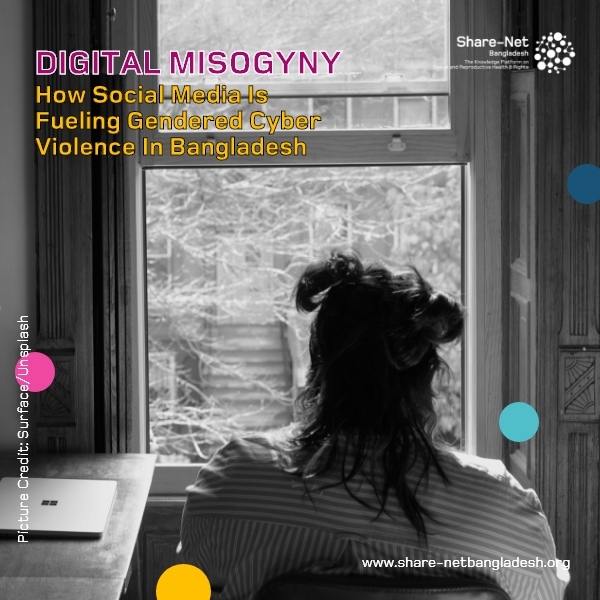Digital Misogyny: How Social Media Is Fueling Gendered Cyber Violence in Bangladesh
Respecting mothers, daughters, and sisters is deeply rooted in Bangladeshi culture. Also, our devotion to our respective religions emphasises women’s respect and rights. Yet, we witness derogatory attitudes towards women far too often. The situation is worsening with the rise of social media, where gendered disinformation and misogyny run rampant.
A recent study by the Tech Global Institute reveals that, “Over 1,400 social meida posts, 70 percent of which were sexual, targeted female leaders during the last election,”. This study, which analysed nearly 25,000 pieces of Facebook content from December 2022 to January 2024, highlights the alarming use of gendered disinformation against female politicians in Bangladesh. Despite the country being led by women for the past 33 years, misogyny, male chauvinism, and attacks on Sexual and Reproductive Health and Rights (SRHR) remain rampant.
In a society that prides itself on facilitating women’s empowerment, the findings expose a darker reality. The study found that the number of female BNP politicians subjected to such online violence was ten times higher than their Awami League counterparts. High-profile victims include BNP’s Khaleda Zia, Shama Obaid, and Rumeen Farhana; as well as Awami League’s MP, Momtaz Begum, and even the Prime Minister, Sheikh Hasina herself! These content included incorrect information, deep-fake videos, doxxing, hate speech, violent threats, and explicit material; all designed to undermine their credibility and deter their political engagement.
The prevalence of these attacks points to a deep-seated misogyny and male chauvinism in the political landscape. Women’s participation in politics has been on a downward trend, with less than five percent of candidates in the last national election being women. The traditional belief that politics is a man’s domain continues to discourage women from pursuing leadership roles. When women defy these societal norms, they face intense gendered intimidation, including threats of sexual violence. Such tactics not only violate SRHR but also hinder progress towards Sustainable Development Goals (SDGs) related to gender equality and women’s empowerment.
The government’s response to this crisis has been inadequate. While there have been claims of efforts to monitor and regulate cyberspace to curb cybercrimes and disinformation, tangible results are lacking. The need for stricter measures against technology-facilitated gender-based violence (TFGBV) is urgent. Without decisive action, the goal of achieving a more inclusive and equitable political environment will remain out of reach.
As Bangladesh aims to become a “Smart Bangladesh,” it must prioritize combating online misogyny and male chauvinism. Ensuring women’s safety and promoting their active participation in politics is essential for achieving SDGs related to gender equality, good health and well-being, and reduced inequalities. The government must not only implement but also enforce strict regulations against TFGBV.
It is time for Bangladesh to reflect on its commitment to women’s empowerment. The circulation of malicious content targeting female politicians is a stark reminder that there is still a long way to go. By addressing the root causes of misogyny and male chauvinism and protecting SRHR, Bangladesh can move closer to a future where women can participate freely and safely in all spheres of life.
Our national poet Kazi Nazrul Islam wrote in his poem ‘Nari’ (Women), “All the great creations and eternally good of the world are done equally by both women and men.” It is high time for Bangladeshi men to change their attitudes towards women. We must stop cyberbullying and work together to build a stronger, more inclusive nation.
Source: The Daily Star
Picture Credit: Surface/Unsplash


